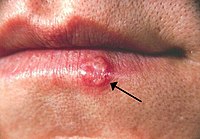
Photo from wikipedia
Herpes simplex Type 1 (HSV-1) is a neurotropic virus that infects the peripheral and central nervous system. Usually, after primary infection in epithelial cells, HSV-1 migrates retrograde to the peripheral… Click to show full abstract
Herpes simplex Type 1 (HSV-1) is a neurotropic virus that infects the peripheral and central nervous system. Usually, after primary infection in epithelial cells, HSV-1 migrates retrograde to the peripheral nervous system (PNS), where it establishes a latent infection. HSV-1 can remain latent in the nervous system, and its reactivation in the brain can rarely cause acute HSV-1 encephalitis, often a life-threatening condition, or asymptomatic reactivations that could lead to neuronal damage and ultimately neurodegenerative disorders. Acyclovir and related nucleoside analogs have been used as therapeutic agents for HSV-1 infection, but resistance to the drug can arise, and the protective effect of HSV-1 on brain cells is limited. Therefore, there is an urgent need for research into safe and effective new antiviral agents that can protect brain cells from the damage that is caused by HSV-1 infection. Vaccinium bracteatum Thunb. (VBT) is widely distributed in Korea and China, and has pharmacological actions such as anti-inflammatory, antioxidant, and antidiabetic activity. Studies on the antiviral effect of VBT on HSV-1 infection have not been reported so far. Therefore, we sought to determine the HSV-1 antiviral effect and molecular mechanism of VBT at the cellular level. We confirmed that VBT repressed the VP16 and IE genes in both Vero and SK-N-SH cells. We also found that the generation of HSV-1 virions was inhibited by VBT treatment. VBT inhibited the activities of the HSV-1-induced endoplasmic reticulum (ER) stressors PERK, ATF4, and CHOP. We confirmed that VBT inhibited the activity of apoptosis factors by regulating the expression of death receptor (DR) after HSV-1 infection. As HSV-1 is closely associated with brain diseases, the study of the antiviral drug effects and mechanism of VBT is meaningful. Further studies using animal models of infection will also be performed to determine the potential of VBT as an antiviral agent.
Journal Title: Antioxidants
Year Published: 2022
Link to full text (if available)
Share on Social Media: Sign Up to like & get
recommendations!